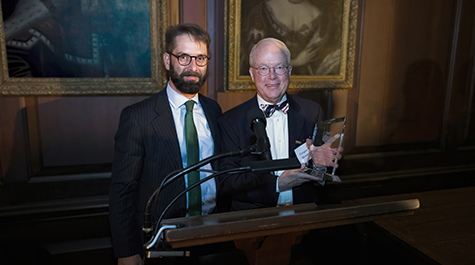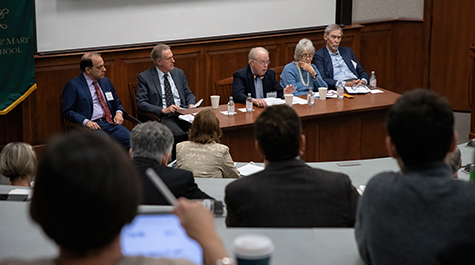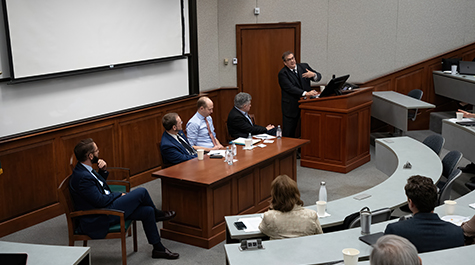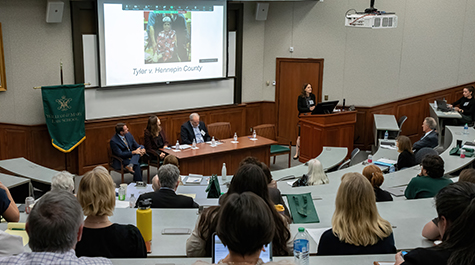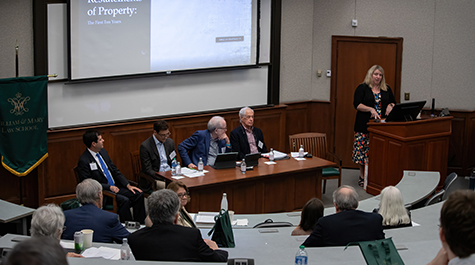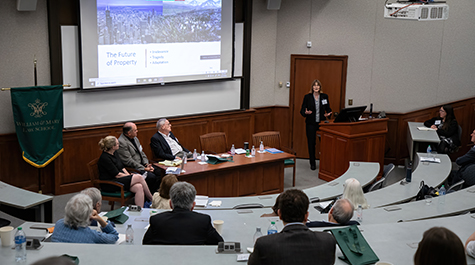Brigham-Kanner Property Rights Conference Celebrates Twentieth Year at William & Mary Law School
Scholars and lawyers from around the country gathered on October 26 and 27 at William & Mary Law School for the 20th Annual Brigham-Kanner Property Rights Conference, the leading conference dedicated to exploring the importance of property rights in the United States.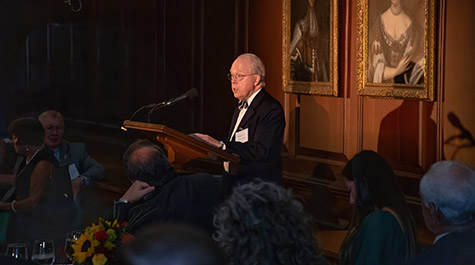
A centerpiece of the Conference is the conferral of the Brigham-Kanner Property Rights Prize, which honors an individual who has advanced the cause of property rights and helped bring about greater awareness of the important role that property plays in protecting individual liberty. This year, the Brigham-Kanner Prize was conferred on Gregory S. Alexander, the A. Robert Noll Professor of Law Emeritus at Cornell Law School and a major contributor to American property law scholarship for more than 25 years.
“To say that I’m humbled to receive this award would be an understatement,” Alexander told attendees. “The company I joined is a ‘Who’s Who’ of property scholars and practitioners…. To be included in that company is truly humbling and, for me, an unexpected honor.”
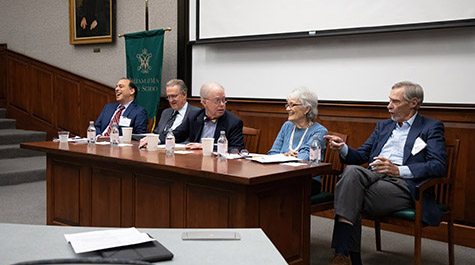 Alexander received the prize at an awards dinner in the Great Hall of William & Mary’s Wren Building, the oldest university building in the United States. In the candle-lit room where such legal luminaries as Thomas Jefferson and John Marshall studied law, Alexander recalled an ancient intellectual tradition, noting how he had been influenced by Aristotle’s theory of property and his idea of human happiness.
Alexander received the prize at an awards dinner in the Great Hall of William & Mary’s Wren Building, the oldest university building in the United States. In the candle-lit room where such legal luminaries as Thomas Jefferson and John Marshall studied law, Alexander recalled an ancient intellectual tradition, noting how he had been influenced by Aristotle’s theory of property and his idea of human happiness.
“My basic thought was that the economic theory of property was right as far as it went, but that it was incomplete,” he said. While economic accounts provide a useful description of property’s origins and organization, “My concern was normative: What values ought to be the foundation of property rights?” The answer he came to champion drew from Aristotle’s idea of human flourishing.
This year’s Conference began with an expert discussion of Alexander’s contribution to property law, followed by a series of discussion panels on property both practical and theoretical. They included a session on the role of equitable doctrines and procedures in property law, the likely impact of the American Law Institute’s new property law restatement, and questions concerning the scale of individual property rights and their constitutional protection in connection with issues like water supply disruptions, housing shortages, and environmental disasters.
A roundtable discussion on emerging issues in property rights litigation looked at topics including home equity theft issues in connection with the Supreme Court’s recent decision in Tyler v. Hennepin County, recent Supreme Court cases on the Takings Clause, and the role of state governments in protecting property rights.
A Major Milestone
Over two decades, the Conference has brought scholars and lawyers together to achieve a fuller understanding of the role that property rights play in society. 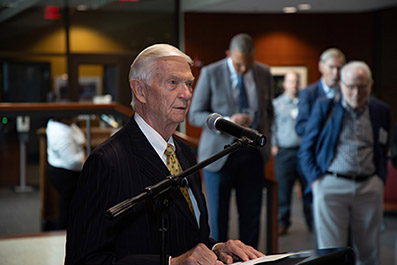
Named for two distinguished property rights advocates—attorney Toby Prince Brigham and law professor Gideon Kanner—the Conference was originally conceived by William & Mary Law School alumnus Joseph T. Waldo ’78, who has remained involved since it began.
At a reception to commemorate the Conference’s two decades, former Dean W. Taylor Reveley III noted the essential role Waldo played in helping to turn the “acorn” of an idea into what had become a “mighty oak.”
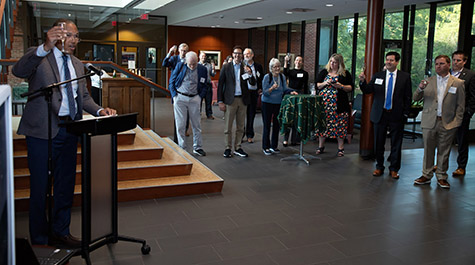 A. Benjamin Spencer, the Law School’s current Dean and Trustee Professor, noted the contributions of Waldo and many others to make the Conference a sustained success. “Thanks to all of you for your continued support,” he said, raising a glass of champagne. “Here’s to another 20 years of shaping the future of property law together.”
A. Benjamin Spencer, the Law School’s current Dean and Trustee Professor, noted the contributions of Waldo and many others to make the Conference a sustained success. “Thanks to all of you for your continued support,” he said, raising a glass of champagne. “Here’s to another 20 years of shaping the future of property law together.”
With the Conference entering its third decade, Andrew Prince Brigham, a property rights attorney and the son of Toby Brigham, reflected on the growth and achievement of the Conference through the years.
“We share a story—everyone in this room—even if this is your first occasion, you’re stepping into a chapter of an unfolding story that we’ve all been part of,” Brigham said. “Think about what this conference has accomplished—it really is tremendous; it really has a nobility to it; it’s virtuous, it has value, it has ideas, but they’re powerful ideas.”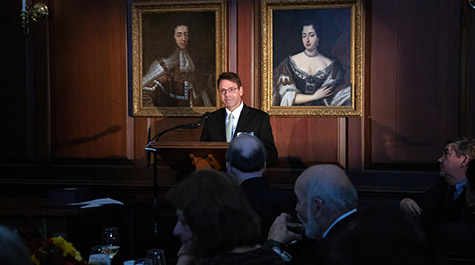
About the Brigham-Kanner Property Rights Conference
The Brigham-Kanner Property Rights Conference is renowned for its outstanding panel discussions and for bringing together members of the bench, bar and academia.
Sponsored by William & Mary Law School since its inception, the conference has taken on a larger international perspective as more and more countries deal with property rights issues. In 2011, the conference was held at Tsinghua Law School in Beijing, China, and in 2016 at the Grotius Center of International Legal Studies at the World Court in The Hague, Netherlands. Future international events are being planned.
Recipients of the Brigham-Kanner Property Rights Prize include Frank I. Michelman (2004), Richard Epstein (2005), James W. Ely, Jr. (2006), Margaret Jane Radin (2007), Robert C. Ellickson (2008), Richard E. Pipes (2009), Carol M. Rose (2010), Sandra Day O’Connor (2011), James E. Krier (2012), Thomas W. Merrill (2013), Michael M. Berger (2014), Joseph William Singer (2015), Hernando de Soto (2016), David L. Callies (2017), Stewart E. Sterk (2018), Steven J. Eagle (2019), Henry Smith (2020), Vicki Been (2021), James S. Burling (2022), and Gregory S. Alexander (2023).
Learn more about the William & Mary Law School Property Rights Project.
